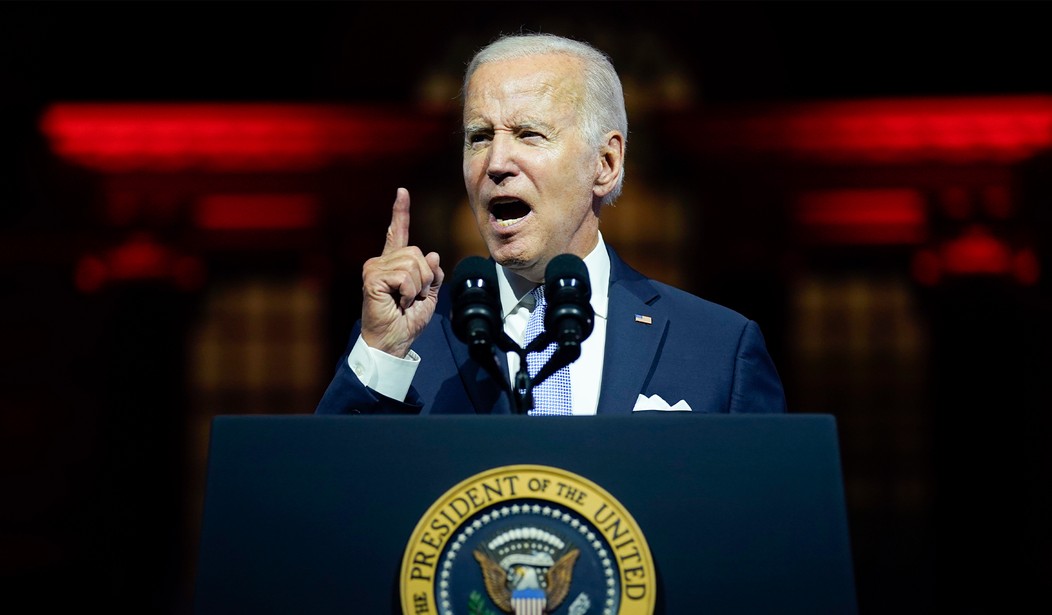It’s been a week, and I’m still reeling from Joe Biden’s extraordinarily divisive speech – the one that was so divisive that the only good thing to come out of it is that it settled, once and for all, the question of whether Biden can be a unifying force in America today. The answer: No – unless by “unifying” you’re referring to his ability to unify his fellow citizens in the belief that he is not a leader who can bring the country together.
Clearly, Biden felt a need to shake things up before the traditional Labor Day campaign season kickoff. The first 19 months of his presidency have not gone well: inflation raging out of control at 40-year highs and the effective pay cut that comes with it; rising rates of violent crime in cities big and small, and even suburbs across the country; a never-before-seen surge of illegal immigration at the southern border, with senior administration officials gaslighting the country on whether the problem even exists; and the calamitous withdrawal from Afghanistan (which likely was the decisive data point in Putin’s decision to invade Ukraine, and which surely is being factored in to Xi Jinping’s calculations regarding Taiwan) combined to drive Biden’s job approval ratings to record low levels.
Given that one of the advantages of the presidency is the ability to generate news coverage on any given topic at any given time simply by stepping up to a podium and leaning into the microphones – what one writer called “the single greatest home court advantage in the modern world” – Biden’s decision to deliver a presidential oration was not at all surprising.
His choice of setting, his staff’s advance work, his tone of voice, and his text, on the other hand, were – and not only were they surprising, they were all wrong.
Recommended
To begin, the setting. The lighting choice was terrible. Bathing Independence Hall behind him in deep red against black evoked memories of newsreel imagery of foreign authoritarians.
His tone was even worse. “Angry” is not the tone a president should seek when addressing the nation. And by “tone,” I don’t just mean tone of voice – if you watched the 24-minute speech with the sound off, and just watched Biden’s body language, you’d have known the words he was delivering were full of nothing but bile and vitriol.
The text itself was worst of all.
A president delivering a somber yet stirring speech to rally the country against an enemy threat is not new. Franklin Roosevelt, Ronald Reagan and George W. Bush all delivered grave yet inspiring addresses when the times called upon them to do so. Nazi Germany, Soviet communism, and Islamic terrorism all posed serious threats to the United States and its interests, and a presidential address to explain and warn and rally the country was appropriate.
Of course, in each of those cases, the threatening enemy about which the president was warning was a foreign enemy.
American presidents don’t label their domestic political opponents “enemies” – because they are not. They are opponents. They are adversaries. They are rivals for political power. But they are not “enemies.”
The essence of leadership is forging coalitions among unlikely partners. The message of Biden’s speech, by contrast, manufactured needless enmity with his careless use of the term “enemy.” This is not the first time, sadly, that Biden has used extreme rhetoric to disparage his opponents. During the debt ceiling negotiations in 2011, when he was vice president, he referred to Tea Party Republicans as “terrorists.” Campaigning in 2012, speaking to a crowd that included many black voters, he said of Republicans, “They’re gonna put y’all back in chains.” And earlier this year, campaigning for passage of the Democrats’ ill-named “Freedom to Vote Act,” he compared opponents of this terrible legislation to segregationist Alabama Governor George Wallace, to Confederate President Jefferson Davis, and even to Bull Connor, the Birmingham, Alabama city official who directed the use of fire hoses and police attack dogs against civil rights protesters.
For any who might still cling to the absurd notion that Joe Biden’s speech was an example of his efforts to unify the nation, allow me to bring Mr. Google into the argument: When, out of curiosity, I popped the phrase “examples of Joe Biden being divisive” into a Google search window, the very first search result I got was this: “Remarks by President Biden on the Continued Battle for the Soul of the Nation,” the official White House transcript of Biden’s remarks at Independence Hall.
Jenny Beth Martin is Honorary Chairman of Tea Party Patriots Action.

























Join the conversation as a VIP Member